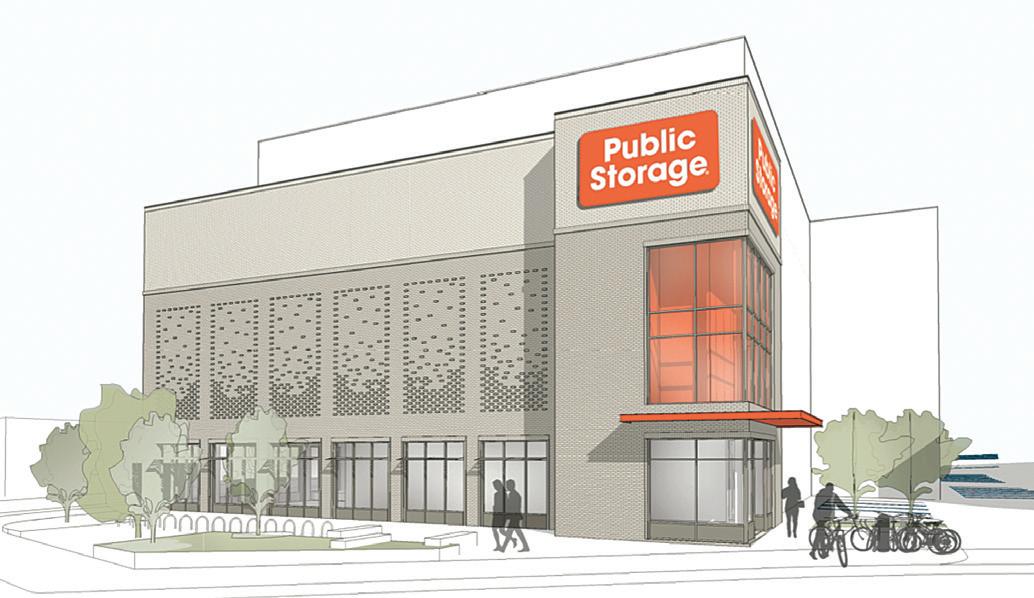
2 minute read
‘Proofreading error’ will allow self-storage facility on BeltLine
By Dyana Bagby
A controversial self-storage facility will soon be built on prime Atlanta BeltLine property due to a 2019 clerical error that was overlooked by the Atlanta City Council and staff.
The oversight allowed Atlanta Botanical Garden (ABG), located within Piedmont Park, to gain city approval to build a new Public Storage building in the VirginiaHighland neighborhood on Monroe Drive, between Kanuga Street and Cooledge Avenue.
ABG’s building of the Public Storage facility on Monroe is part of a land swap with the California-based company. ABG wants to expand about seven acres along Piedmont Avenue where a Public Storage building now stands. Plans are for ABG to raze the existing building and construct a replacement facility in Virginia-Highland.
The nearly two-acre site for the new Public Storage building, zoned light industrial, is steps away from the Eastside Trail entrance where it connects to the southern tip of Piedmont Park, a busy area for pedestrians and cyclists. Vacant buildings now stand on the site.
ABG’s plans angered many VirginiaHighland residents, including the powerful Virginia-Highland Civic Association. The plans were also blasted by the advisory Atlanta BeltLine Design Review Committee.
Self-storage buildings are vehiclecentric and contrary to the BeltLine’s vision for public access to live-work-play areas, said residents and committee members
And, in fact, self-storage buildings were not supposed to be built along the BeltLine. A 2017 ordinance approved by the city council prohibited self-storage buildings within 500 feet of the Beltline because they are “are incompatible with the objectives, purposes and intent” of the BeltLline.
Soon after the 2017 ordinance was approved, former mayor Kasim Reed announced a $100 million expansion of Piedmont Park and the Atlanta Botanical Garden.
Also during this time, the city started the multi-year process of rewriting its entire zoning code, something not done since 1982.
The city decided to tackle the massive zoning rewrite in phases. In 2019, the council approved hundreds of amendments, called “quick fixes.” These amendments are considered changes dealing with things like accessory dwelling units, density requirements in certain areas and what could be built in industrial districts.
Somehow, the approved amendments under Section 3 erased the 2017 ordinance banning self-storage units within 500 feet of the BeltLine.
“As far as I can tell, it was an absolute unintended mistake,” said Aaron Fortner, a planning consultant for the VirginiaHighland Civic Association’s planning committee.

“It was not an informed, purposeful decision to take the restriction on selfstorage out of the zoning code,” Fortner said. “People did not realize the mistake had been made until this Botanical Garden thing happened.”
In mid-June, the city council corrected the mistake and passed an ordinance banning self-storage buildings, warehouses, and distribution centers in light industrial districts. ABG property on Monroe is zoned light industrial.
The legislation noted a “proofreading error during recent quick fix zoning updates to the Atlanta City Code” that permitted self-storage buildings, warehouses and distribution centers in light industrial district “but not limited within the BeltLine Corridor.”
“It’s a little too late … but at least we can prevent this from happening again,” Fortner said of the new legislation. “[Selfstorage buildings] are not the best use to be on our premier transit corridor in the city of Atlanta.”
“It was just it was an absolute, crazy alignment … the perfect storm of a scenario that the [the restriction] got inadvertently taken out and no one knew,” he said.
The legislation doesn’t impact ABG’s plans. Danny Flanders, spokesperson for the Garden, said ABG was unaware of the 2017 ordinance and its removal in 2019.
“We based our information on the code as written,” he said.










